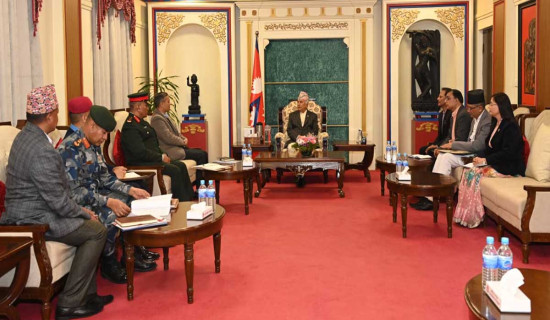- Saturday, 14 February 2026
Sohra Shraddha Ritual
Paying Homage To The Deceased Parents
As Hindus across Nepal observe the Sohra Shraddha period, it’s important to reflect on the true meaning behind this ritual. Equally important is to consider how we cared for our parents when they were alive. Why do we sometimes go to great lengths with shraddha ceremonies if we did not care for them during their lifetime?
Human beings form deep bonds with their loved ones, and parents hold a special place in everyone’s life. Having lost my father three years ago, the void he left can never be filled. The same applies to my parents-in-law. I often long for their guidance, both personally and professionally. However, remembering them is not limited to the tithi when they passed. When I reflect on my relationship with them, I feel content with the time we shared and how I served them as both a daughter and a daughter-in-law. In my family, we’ve begun honouring our ancestors not only through traditional offerings at home but also by visiting elderly homes and providing at least one meal, hoping it honours the spirits of our parents and in-laws.
Reverence
Respect and reverence for ancestors are deeply ingrained in Hindu culture. According to Hindu beliefs, the deceased family members reside in the heavenly domain and must be offered food on the day of their departure, according to the lunar calendar. These offerings, usually performed by sons, happen twice a year—once on the exact tithi of their death and again during Sohra Shraddha or Pitri Paksha, which precedes the Navratri festival, known as Dashain in Nepal.
Pitri Paksha, or the fortnight of ancestors, is a 16-day period during which Hindus pay homage to their ancestors, also known as Pitris. This period goes by several names depending on the region, including Pitru Paksha, Sohra Sharddha, Jitiya, and Apar Paksha. Despite the different names, the belief remains the same: this time is dedicated to honouring ancestors. Families consult their priests to determine the specific day during the 16 days that corresponds with the passing of the father, and shraddha is performed for him, as well as for the mother if she has also passed. If both parents have passed, the shraddha is conducted based on the father’s tithi, reflecting the patriarchal system in most Hindu cultures. This year, Sohra Sharddha is being observed from September 18th and will conclude on October 2nd, with Navratri beginning on October 3rd.
Hindu rituals often involve the chanting of Sanskrit mantras, which have meanings relevant to the event and offer a sense of peace and comfort to those who believe in the process. During the Sohra Shraddha period, tarpan mantras are recited, believed to connect us with our ancestors, offer our respects, and seek their blessings. While the scriptures state that understanding the meanings of these mantras and pronouncing them correctly helps honour our ancestors and maintain our cultural heritage, many people who perform the shraddha rely solely on priests. Various mantras, such as the Ganesh mantras, Pitri mantras, and Gayatri mantra, and peace mantras are chanted to invoke the spirits of ancestors and offer them food and water.
These mantras are meant to be more than mere words; they are expressions of love, respect, and gratitude towards those who came before us and passed on their traditions. By chanting these mantras, we keep our ancestors' memory alive and ensure their peace in the afterlife, while inviting their blessings upon our families.
Shraddha also has social value, as daughters who have married and left their homes are invited back for the ceremony, providing an opportunity to catch up with siblings and honour shared traditions. Originally a communal event, brothers would perform the shraddha together. However, as times change, this has shifted to individual ceremonies in different places, making it more difficult for families to gather in the same way.
As Nepal becomes more urbanised and modern lifestyles take root, traditional values and practices are often challenged. The rapid pace of life in cities and the increasing tendency for younger generations to seek employment abroad or in urban centres has created a growing gap between family members. Elderly parents, once cared for within the joint family system, are now often left behind in rural areas, or in some cases, sent to elderly care homes due to the pressures of modern living. This shift has raised questions about how we can reconcile the traditional expectations of caring for our elders with the demands of contemporary life.
Cultural identity
In addition, the rise in nuclear families has contributed to a sense of isolation among the elderly. While rituals like Sohra Shraddha are valuable in maintaining our cultural identity, it’s equally crucial to remember that the essence of these practices lies in the respect and care we show our elders during their lifetime.
As more families become separated by distance, it may be time to consider alternatives to traditional shraddha ceremonies. Offering financial support, staying connected through modern technology, and ensuring the wellbeing of elderly parents in their everyday lives are just as important as performing rituals after they have passed. As rituals and traditions become more cumbersome in modern times, there may be a need to adapt these practices. However, the real question is: “Have we cared for our elderly when they needed us?” If the answer is yes, then performing even a simple shraddha will bring peace, knowing we did our part while they were alive. As we observe Sohra Shraddha, let us resolve to care for our elders during their lifetime and continue to honour them after they leave us.
(Namrata Sharma is a senior journalist and women rights advocate and can be reached at namrata1964@yahoo.com Twitter handle: @amrataSharmaP)
















-original-thumb.jpg)
